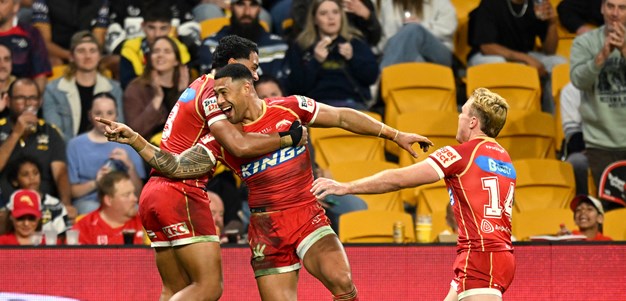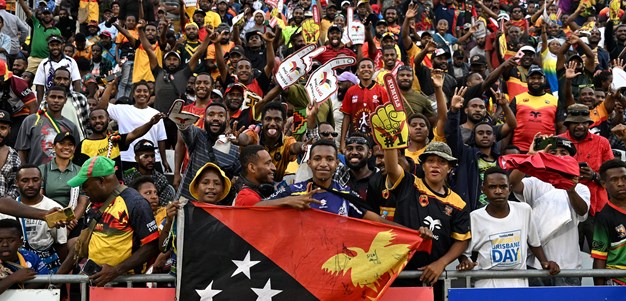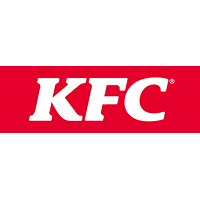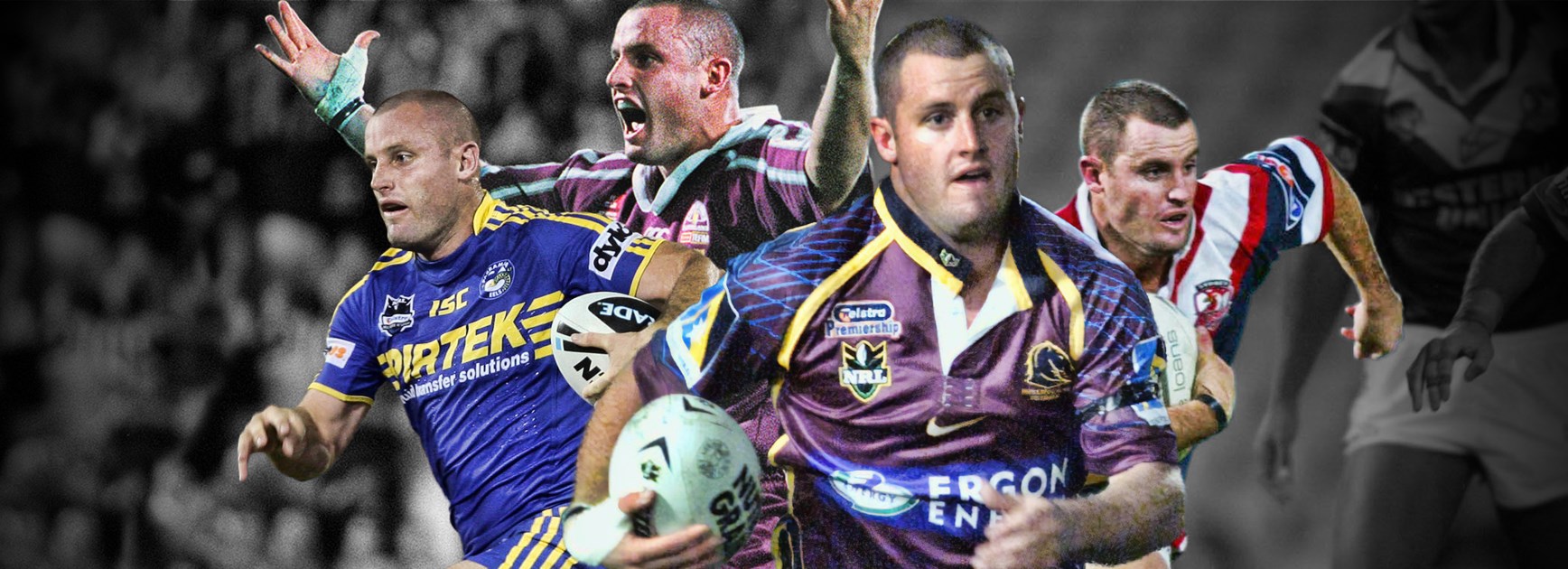
Former Maroons flyer Chris Walker’s career was as colourful on the field as it was off it.
He played at no less than six clubs, appeared in two grand finals, and was part of the Queensland team which won the 2001 State of Origin series.
In this latest instalment in a series of Legend Q&As from the Rugby League Week archives, Walker reflects on the highs and lows of his career and sheds light on the death threats that had him wondering whether he would be shot dead on the field of play.
Chris Walker
In 2001 you had a wonderful year for the Broncos and starred in a winning Origin series for Queensland. Great memories?
The highlight of that year was getting the call-up to play my first Origin game at the old Lang Park. It was extra special because my dad [Garry] played there in the 1980 Brisbane grand final. Then I got to play there in the last State of Origin game before they tore it down. Wayne Bennett had told my brother Shane I was going to be selected beforehand, but he never told me. I found out watching the news. I jumped around the lounge room like a madman and Shane sat there and said, ‘I knew three days ago’.
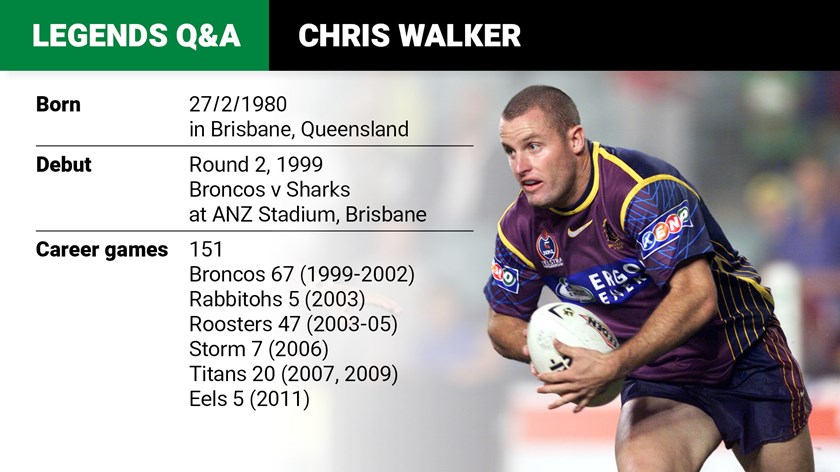
Why were you on song in 2001?
Shane had a really good training ethic and when the season finished he’d do triathlons. At the end of 2000 I trained with him the six weeks of the off-season. I jumped on the bike and did swimming and runs. I went above and beyond what I had done the years before. Shane took me out of my comfort zone and I went into that 2001 season a lot fitter and a lot more confident.
Why did you leave the Broncos for Souths at the end of 2002?
They offered me a huge contract, but I was dating a girl in Sydney. Every spare minute I had I’d be on a plane to see her, or she’d be on a plane up to see me. I had a meeting with Wayne and he said, ‘I am not going to force you to stay when you have a love interest in Sydney’. Looking back, I never should have left Wayne. I played at a lot of clubs but I never found a coach who could get the best out of me like he could. Wayne knew I was a bit of a space cadet when I was young, but he was good with me. I'd go to him with my off-field stuff all the time.

At functions you say how Wayne Bennett once said to you that ‘suicide is a permanent solution to a temporary problem’. Why?
I was going through a hard time. I’d just turned 19 and one of my best mates from school killed himself. I remember going over to Wayne’s place for a couple of hours to talk to him about what happened and what I was going through. He wrote out on a post-it note that ‘suicide is a permanent solution to a temporary problem’. I had that in my wallet until I lost it seven years later.
You signed a good deal with Souths, but left after five games. Why?
I signed a $1 million deal over three years, with a car. After coming from a professional club like the Broncos I wanted to build something there, but I wasn’t happy. This story has never been told, but they didn’t do a lot of things they’d promised. My car nearly got repossessed. It was in my name and they were supposed to be paying for it, but they weren’t. I spoke to them about all the issues, but nothing improved.
And the Roosters picked you up...
I had a meeting with the Waratahs coach Bob Dwyer and I was real close to signing with union. But my manager Chris Orr said Ricky Stuart was interested. I had a few mates there like Mini (Anthony Minichiello) and Finchy (Brett Finch). They were a good club and had just won a grand final.
Have you got a favourite Roosters anecdote for us?
We had a drinking session one Sunday night at Bondi and I’ve gone home under the weather. I set the alarm, but it didn’t go off. On Monday I got a call from John Cartwright at 10.30am and training started at 10. He said, ‘Where are you?’ I got out of bed, jumped in a taxi and got to training. Ricky Stuart was filthy and the penalty for the whole club was the old ‘four in five’ – which is four laps of the oval in five minutes and those that don’t make it have to go again. I’ve flown out of the blocks, because I was fresh. After two laps I led everyone by about a lap and a half. I was flying. Then I looked down and realised I only had one boot on! Brett Finch still loves to tell that story.
You left the Roosters in 2005 and went to Melbourne…
I had a bit of a disagreement with 'Sticky' at the end of 2005. I’d been getting on the drink pretty heavy and my relationship was falling to bits. I signed with Melbourne, and it was the same thing down there. I didn’t curb my ways off the field, and that didn’t fit in with their culture. The disagreement between Craig Bellamy and myself was brought on by me being irresponsible off the field.
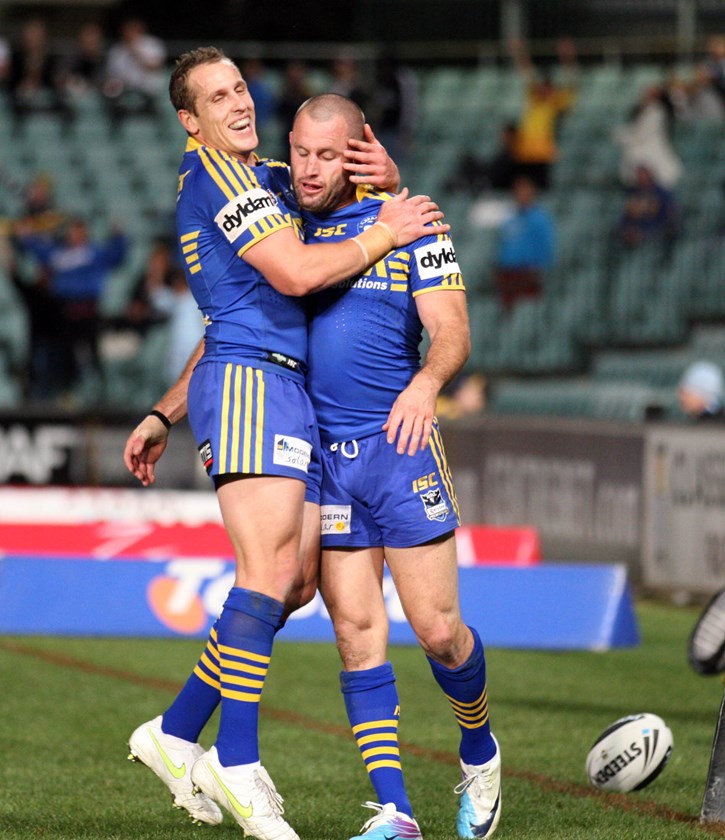
You had a frightening experience with death threats as a player. How did that all unfold?
When I signed with Souths, I started to get death threats in the mail and it really shook me up. One bloke said he was going to shoot me while I was on the field. I remember going to the game that weekend thinking I was a definite target. I was worried I could be running down the sideline… and then someone pulls out a gun and shoots me. Another guy said he was going to cut my head off while I was playing, but I didn’t know how he was going to do that, unless he was an opposition player. In one of the letters they said they were going to shoot me after a game. I was really concerned about what they might do when I was walking back to my car. Back then they didn’t have beefed-up security like they do now.
Any ideas about why you were a target?
I had about eight of these letters sent to me in different handwriting and I thought, ‘What have I done to these people?’ A lot of people obviously didn’t like me. It couldn’t have been because of the way I was playing, because I was still scoring tries, and I know everyone likes people who score tries. If I had abducted someone or done something terrible I would have copped it, but I was just a young fella playing footy. I alerted club officials about the letters. They looked it into it for me, but nothing happened. When you open up your mail and a death threat confronts you… it is heavy. I would open these letters and sit there and wonder whether the people after me were in the same room.
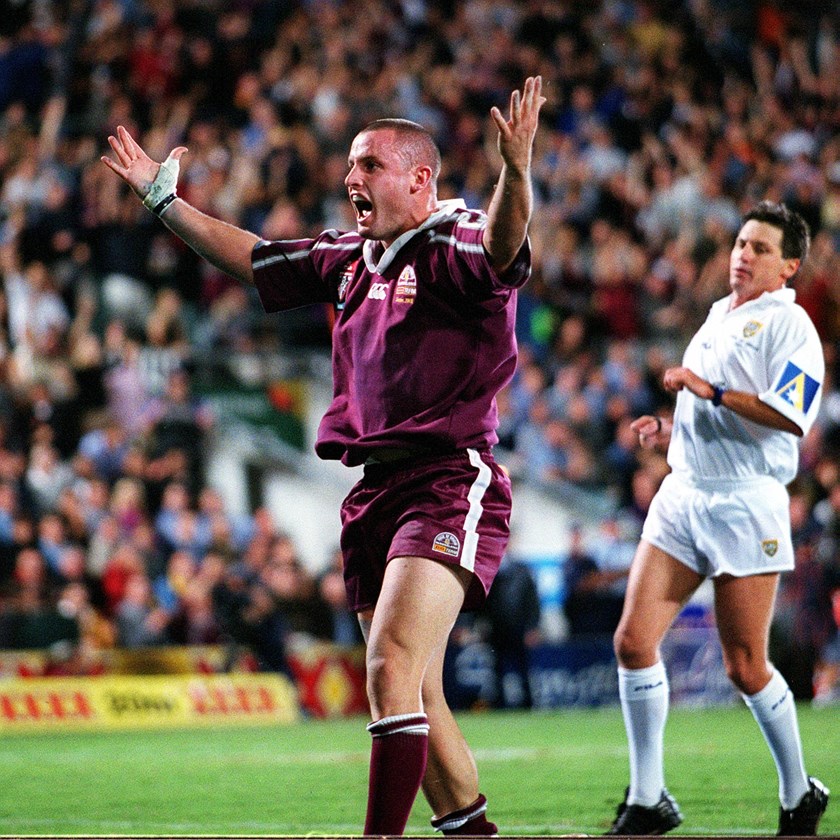
And it was your good mate Wendell Sailor who helped you through it, is that right?
Wendell has always been there for me. I remember he had spoken before about getting death threats himself. So I rang him and I said, ‘How do I deal with this?’ Wendell said to me, 'No-one is going to kill you if they tell you beforehand’. That was reassuring. The letters kept coming for about two years. I don’t know who these people were. We never got to track them down. I have still got the letters at home. Every now and then I pull them out and have a chuckle to myself, but at the time it was definitely daunting.
Wendell Sailor once said people didn’t realise that your drinking issues were your way of coping with anxiety. Is that right?
For some reason, when I’d go to a pub or a restaurant with the boys I would get a bit anxious. One thing I found that would curb my anxiety was to punch a few schooners into me straight away. But by the time you get to the sixth schooner you are ready to party on. It took me until later in life to realise that being anxious and being on the drink didn’t go well together.
You found a home at the Titans. You had a great start, but then things got interesting to say the least!
I scored the first try in the Titans first trial match against Melbourne at Lismore, and again in the first NRL match [against the Dragons]. My contract had a no-drinking clause, and I was going really good with it. But I broke my thumb and was out for six weeks. One of my mates had his birthday. I had a few drinks and knocked a bloke’s drink over at Melba’s. There was nothing in it, but he obviously took offence because he emailed Michael Searle the next morning and I packed my bags for a drug and alcohol rehabilitation clinic at Palm Beach Currumbin for two weeks as an in-patient. The things I saw in that clinic made me realise I am actually a normal person. It also made me realise I had to curb my ways and stay off the drink.
But you bounced back, as you always did?
I was looking forward to 2008, but I snapped my Achilles at our first training camp. All the coaches and staff had a bet about who would win the beep test. Scotty Sattler pulled me aside and said he had money on me. There was me, Scotty Prince and Jordan Atkins left. I thought I better win it for Satts, but three beep tests later I snapped my Achilles. Four months later I snapped it again. The doctor wanted me to retire. But I did hundreds of hours in the gym. Training by myself gave me a lot of strength. I found out a bit about myself.
In 2004 you were turfed out of Origin camp for leaving the team hotel and getting on the drink. What did you get up to?
That might go to the grave with me because it involves other players. I got the CCTV footage of it three weeks later. I was living at the ‘House of Grouse’ in Bondi at the time with Brett Finch, Anthony Minichiello, Michael Crocker and Todd Payten. I showed them the footage and the boys had a nice laugh about it… and they still do. It wasn’t the best highlight reel of myself. Getting hit with capsicum spray by the cops isn’t a favourite pasttime of mine.
Do you look back now and think, ‘What was I doing?’
That was definitely a low point in my career, getting locked up in Origin camp. I was only 24 and I got blacklisted from playing for Queensland for the rest of my career. But I loved playing for Queensland. I played in two Origin series and we won both of them. I was a guy who played 12 colourful years of first grade at the top level, and I don’t know many of those.
This article first appeared in Rugby League Week in 2014.

